Mental Health Recovery Approach America 2022
VerifiedAdded on 2022/09/12
|8
|2157
|24
AI Summary
Contribute Materials
Your contribution can guide someone’s learning journey. Share your
documents today.
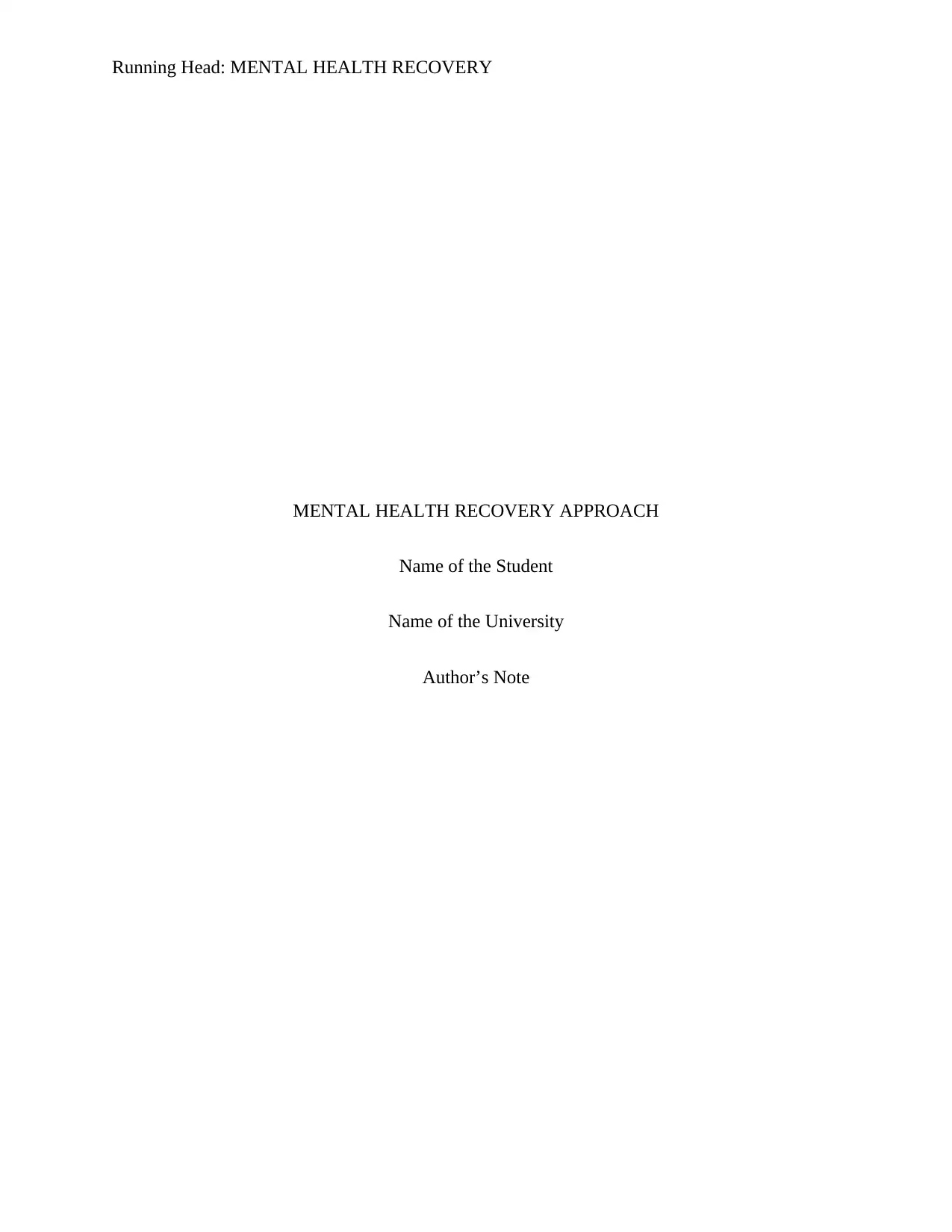
Running Head: MENTAL HEALTH RECOVERY
MENTAL HEALTH RECOVERY APPROACH
Name of the Student
Name of the University
Author’s Note
MENTAL HEALTH RECOVERY APPROACH
Name of the Student
Name of the University
Author’s Note
Secure Best Marks with AI Grader
Need help grading? Try our AI Grader for instant feedback on your assignments.
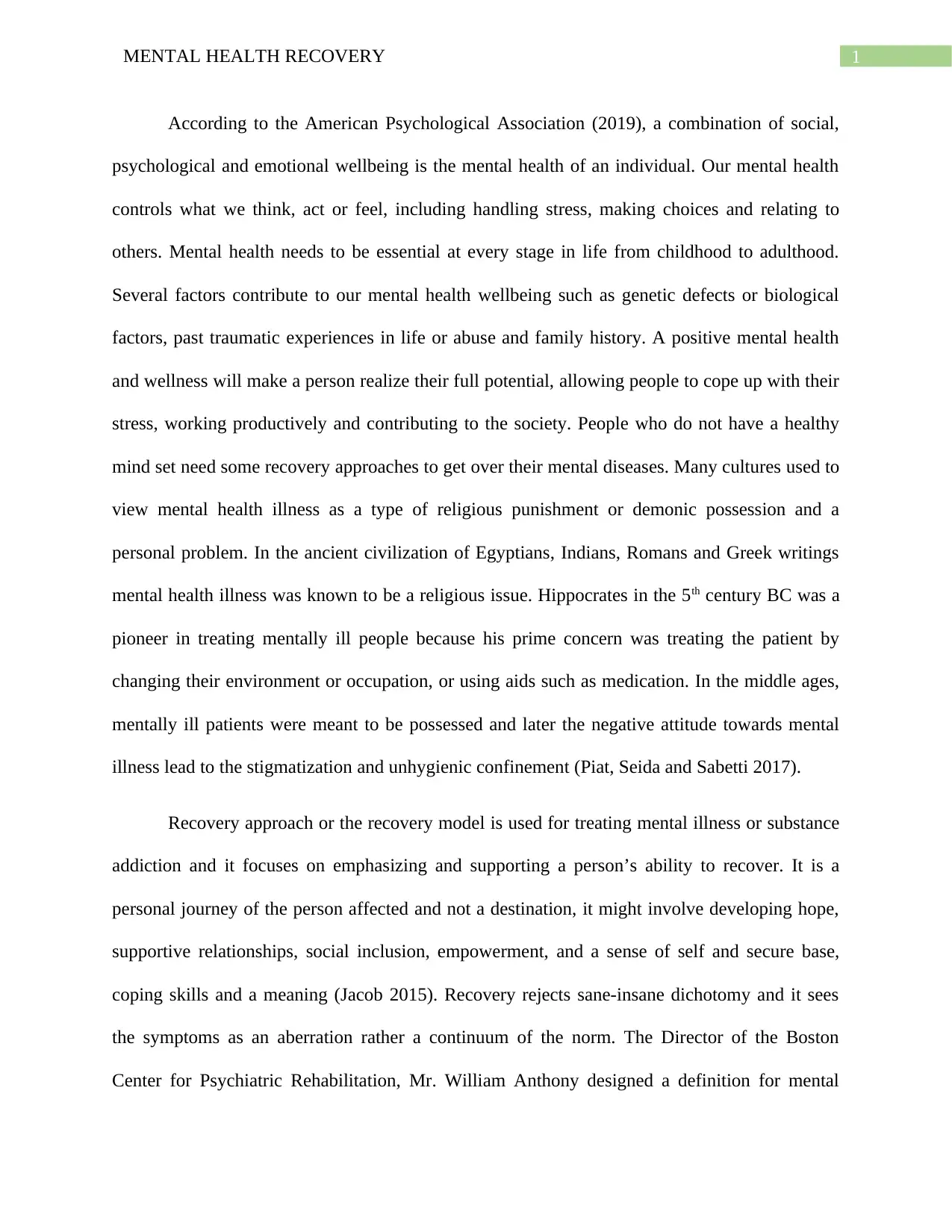
1MENTAL HEALTH RECOVERY
According to the American Psychological Association (2019), a combination of social,
psychological and emotional wellbeing is the mental health of an individual. Our mental health
controls what we think, act or feel, including handling stress, making choices and relating to
others. Mental health needs to be essential at every stage in life from childhood to adulthood.
Several factors contribute to our mental health wellbeing such as genetic defects or biological
factors, past traumatic experiences in life or abuse and family history. A positive mental health
and wellness will make a person realize their full potential, allowing people to cope up with their
stress, working productively and contributing to the society. People who do not have a healthy
mind set need some recovery approaches to get over their mental diseases. Many cultures used to
view mental health illness as a type of religious punishment or demonic possession and a
personal problem. In the ancient civilization of Egyptians, Indians, Romans and Greek writings
mental health illness was known to be a religious issue. Hippocrates in the 5th century BC was a
pioneer in treating mentally ill people because his prime concern was treating the patient by
changing their environment or occupation, or using aids such as medication. In the middle ages,
mentally ill patients were meant to be possessed and later the negative attitude towards mental
illness lead to the stigmatization and unhygienic confinement (Piat, Seida and Sabetti 2017).
Recovery approach or the recovery model is used for treating mental illness or substance
addiction and it focuses on emphasizing and supporting a person’s ability to recover. It is a
personal journey of the person affected and not a destination, it might involve developing hope,
supportive relationships, social inclusion, empowerment, and a sense of self and secure base,
coping skills and a meaning (Jacob 2015). Recovery rejects sane-insane dichotomy and it sees
the symptoms as an aberration rather a continuum of the norm. The Director of the Boston
Center for Psychiatric Rehabilitation, Mr. William Anthony designed a definition for mental
According to the American Psychological Association (2019), a combination of social,
psychological and emotional wellbeing is the mental health of an individual. Our mental health
controls what we think, act or feel, including handling stress, making choices and relating to
others. Mental health needs to be essential at every stage in life from childhood to adulthood.
Several factors contribute to our mental health wellbeing such as genetic defects or biological
factors, past traumatic experiences in life or abuse and family history. A positive mental health
and wellness will make a person realize their full potential, allowing people to cope up with their
stress, working productively and contributing to the society. People who do not have a healthy
mind set need some recovery approaches to get over their mental diseases. Many cultures used to
view mental health illness as a type of religious punishment or demonic possession and a
personal problem. In the ancient civilization of Egyptians, Indians, Romans and Greek writings
mental health illness was known to be a religious issue. Hippocrates in the 5th century BC was a
pioneer in treating mentally ill people because his prime concern was treating the patient by
changing their environment or occupation, or using aids such as medication. In the middle ages,
mentally ill patients were meant to be possessed and later the negative attitude towards mental
illness lead to the stigmatization and unhygienic confinement (Piat, Seida and Sabetti 2017).
Recovery approach or the recovery model is used for treating mental illness or substance
addiction and it focuses on emphasizing and supporting a person’s ability to recover. It is a
personal journey of the person affected and not a destination, it might involve developing hope,
supportive relationships, social inclusion, empowerment, and a sense of self and secure base,
coping skills and a meaning (Jacob 2015). Recovery rejects sane-insane dichotomy and it sees
the symptoms as an aberration rather a continuum of the norm. The Director of the Boston
Center for Psychiatric Rehabilitation, Mr. William Anthony designed a definition for mental
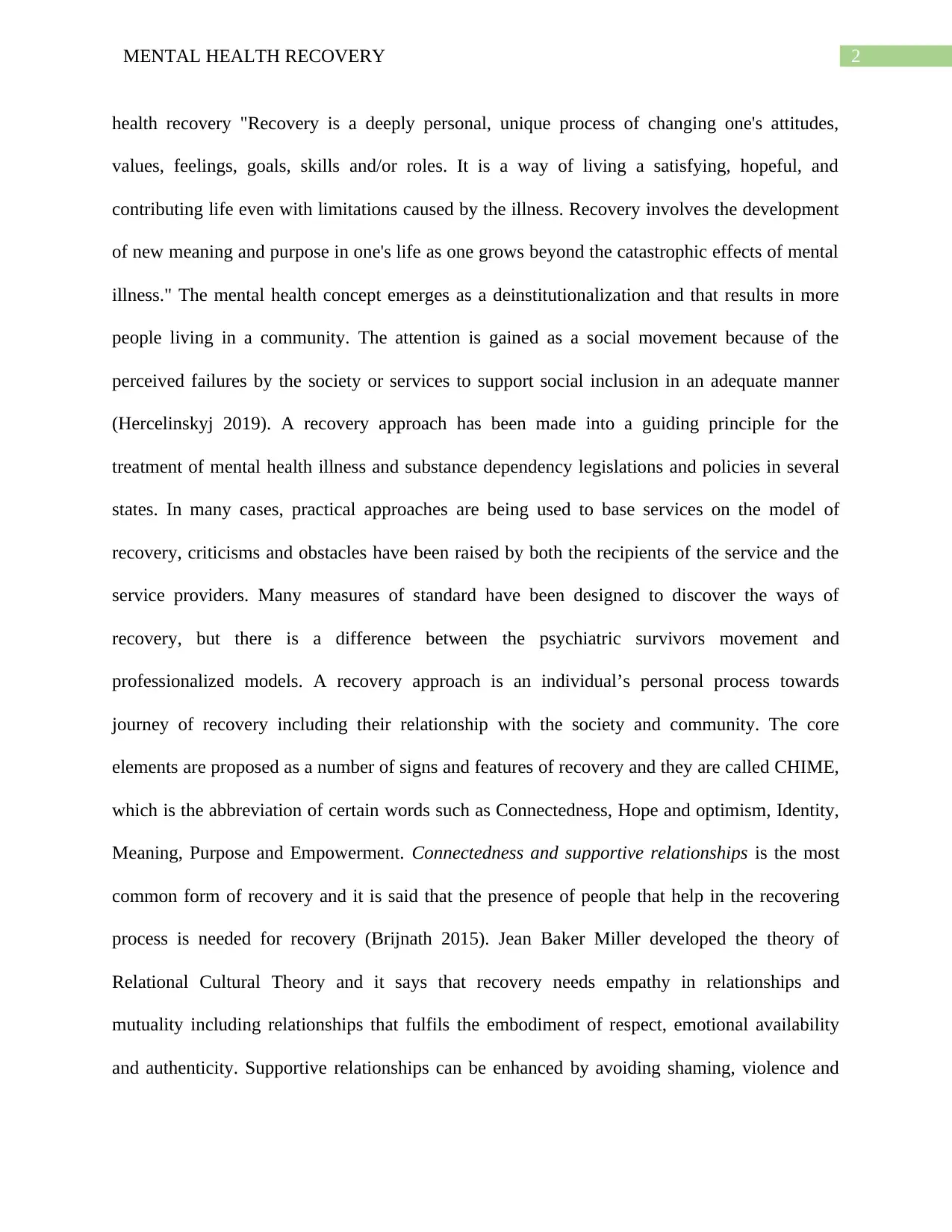
2MENTAL HEALTH RECOVERY
health recovery "Recovery is a deeply personal, unique process of changing one's attitudes,
values, feelings, goals, skills and/or roles. It is a way of living a satisfying, hopeful, and
contributing life even with limitations caused by the illness. Recovery involves the development
of new meaning and purpose in one's life as one grows beyond the catastrophic effects of mental
illness." The mental health concept emerges as a deinstitutionalization and that results in more
people living in a community. The attention is gained as a social movement because of the
perceived failures by the society or services to support social inclusion in an adequate manner
(Hercelinskyj 2019). A recovery approach has been made into a guiding principle for the
treatment of mental health illness and substance dependency legislations and policies in several
states. In many cases, practical approaches are being used to base services on the model of
recovery, criticisms and obstacles have been raised by both the recipients of the service and the
service providers. Many measures of standard have been designed to discover the ways of
recovery, but there is a difference between the psychiatric survivors movement and
professionalized models. A recovery approach is an individual’s personal process towards
journey of recovery including their relationship with the society and community. The core
elements are proposed as a number of signs and features of recovery and they are called CHIME,
which is the abbreviation of certain words such as Connectedness, Hope and optimism, Identity,
Meaning, Purpose and Empowerment. Connectedness and supportive relationships is the most
common form of recovery and it is said that the presence of people that help in the recovering
process is needed for recovery (Brijnath 2015). Jean Baker Miller developed the theory of
Relational Cultural Theory and it says that recovery needs empathy in relationships and
mutuality including relationships that fulfils the embodiment of respect, emotional availability
and authenticity. Supportive relationships can be enhanced by avoiding shaming, violence and
health recovery "Recovery is a deeply personal, unique process of changing one's attitudes,
values, feelings, goals, skills and/or roles. It is a way of living a satisfying, hopeful, and
contributing life even with limitations caused by the illness. Recovery involves the development
of new meaning and purpose in one's life as one grows beyond the catastrophic effects of mental
illness." The mental health concept emerges as a deinstitutionalization and that results in more
people living in a community. The attention is gained as a social movement because of the
perceived failures by the society or services to support social inclusion in an adequate manner
(Hercelinskyj 2019). A recovery approach has been made into a guiding principle for the
treatment of mental health illness and substance dependency legislations and policies in several
states. In many cases, practical approaches are being used to base services on the model of
recovery, criticisms and obstacles have been raised by both the recipients of the service and the
service providers. Many measures of standard have been designed to discover the ways of
recovery, but there is a difference between the psychiatric survivors movement and
professionalized models. A recovery approach is an individual’s personal process towards
journey of recovery including their relationship with the society and community. The core
elements are proposed as a number of signs and features of recovery and they are called CHIME,
which is the abbreviation of certain words such as Connectedness, Hope and optimism, Identity,
Meaning, Purpose and Empowerment. Connectedness and supportive relationships is the most
common form of recovery and it is said that the presence of people that help in the recovering
process is needed for recovery (Brijnath 2015). Jean Baker Miller developed the theory of
Relational Cultural Theory and it says that recovery needs empathy in relationships and
mutuality including relationships that fulfils the embodiment of respect, emotional availability
and authenticity. Supportive relationships can be enhanced by avoiding shaming, violence and
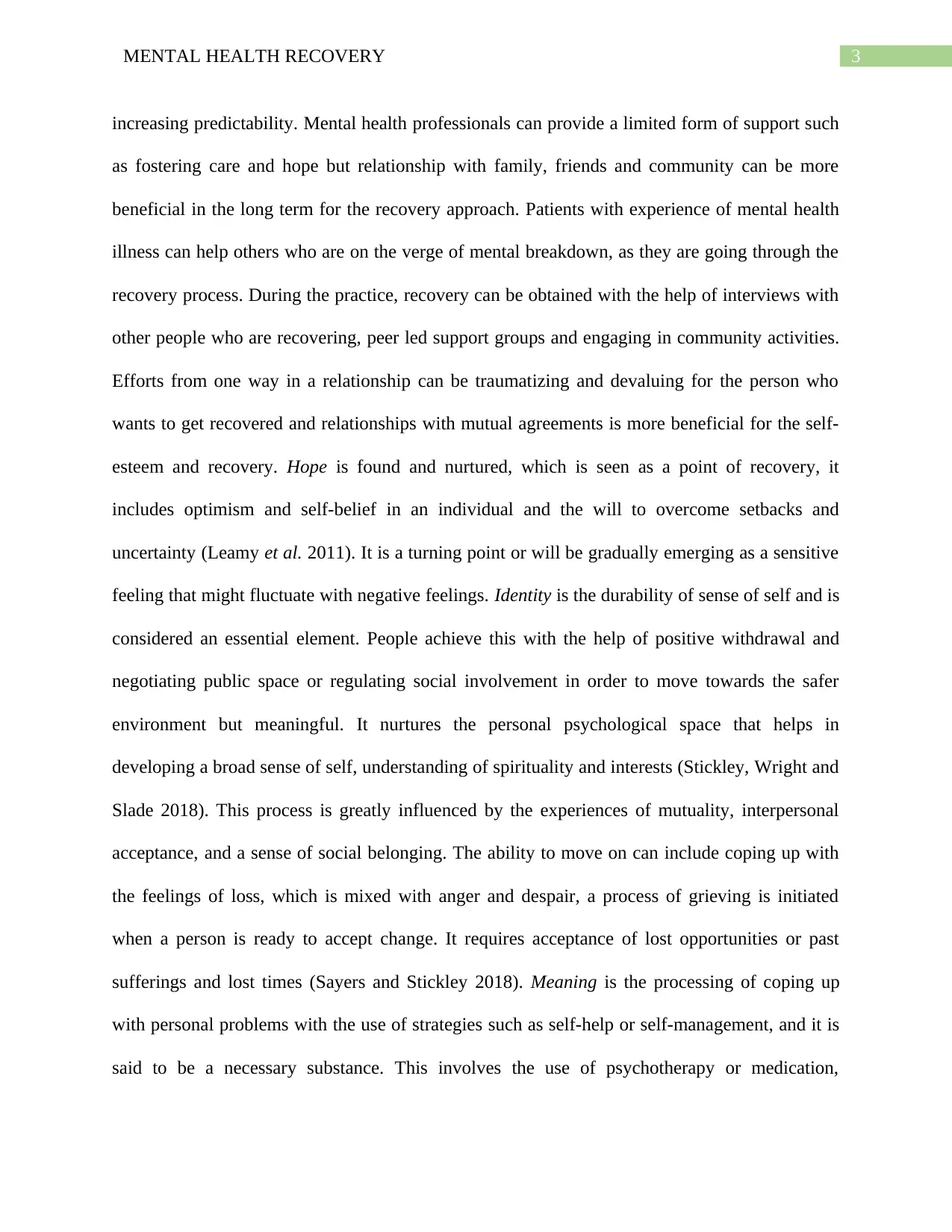
3MENTAL HEALTH RECOVERY
increasing predictability. Mental health professionals can provide a limited form of support such
as fostering care and hope but relationship with family, friends and community can be more
beneficial in the long term for the recovery approach. Patients with experience of mental health
illness can help others who are on the verge of mental breakdown, as they are going through the
recovery process. During the practice, recovery can be obtained with the help of interviews with
other people who are recovering, peer led support groups and engaging in community activities.
Efforts from one way in a relationship can be traumatizing and devaluing for the person who
wants to get recovered and relationships with mutual agreements is more beneficial for the self-
esteem and recovery. Hope is found and nurtured, which is seen as a point of recovery, it
includes optimism and self-belief in an individual and the will to overcome setbacks and
uncertainty (Leamy et al. 2011). It is a turning point or will be gradually emerging as a sensitive
feeling that might fluctuate with negative feelings. Identity is the durability of sense of self and is
considered an essential element. People achieve this with the help of positive withdrawal and
negotiating public space or regulating social involvement in order to move towards the safer
environment but meaningful. It nurtures the personal psychological space that helps in
developing a broad sense of self, understanding of spirituality and interests (Stickley, Wright and
Slade 2018). This process is greatly influenced by the experiences of mutuality, interpersonal
acceptance, and a sense of social belonging. The ability to move on can include coping up with
the feelings of loss, which is mixed with anger and despair, a process of grieving is initiated
when a person is ready to accept change. It requires acceptance of lost opportunities or past
sufferings and lost times (Sayers and Stickley 2018). Meaning is the processing of coping up
with personal problems with the use of strategies such as self-help or self-management, and it is
said to be a necessary substance. This involves the use of psychotherapy or medication,
increasing predictability. Mental health professionals can provide a limited form of support such
as fostering care and hope but relationship with family, friends and community can be more
beneficial in the long term for the recovery approach. Patients with experience of mental health
illness can help others who are on the verge of mental breakdown, as they are going through the
recovery process. During the practice, recovery can be obtained with the help of interviews with
other people who are recovering, peer led support groups and engaging in community activities.
Efforts from one way in a relationship can be traumatizing and devaluing for the person who
wants to get recovered and relationships with mutual agreements is more beneficial for the self-
esteem and recovery. Hope is found and nurtured, which is seen as a point of recovery, it
includes optimism and self-belief in an individual and the will to overcome setbacks and
uncertainty (Leamy et al. 2011). It is a turning point or will be gradually emerging as a sensitive
feeling that might fluctuate with negative feelings. Identity is the durability of sense of self and is
considered an essential element. People achieve this with the help of positive withdrawal and
negotiating public space or regulating social involvement in order to move towards the safer
environment but meaningful. It nurtures the personal psychological space that helps in
developing a broad sense of self, understanding of spirituality and interests (Stickley, Wright and
Slade 2018). This process is greatly influenced by the experiences of mutuality, interpersonal
acceptance, and a sense of social belonging. The ability to move on can include coping up with
the feelings of loss, which is mixed with anger and despair, a process of grieving is initiated
when a person is ready to accept change. It requires acceptance of lost opportunities or past
sufferings and lost times (Sayers and Stickley 2018). Meaning is the processing of coping up
with personal problems with the use of strategies such as self-help or self-management, and it is
said to be a necessary substance. This involves the use of psychotherapy or medication,
Secure Best Marks with AI Grader
Need help grading? Try our AI Grader for instant feedback on your assignments.
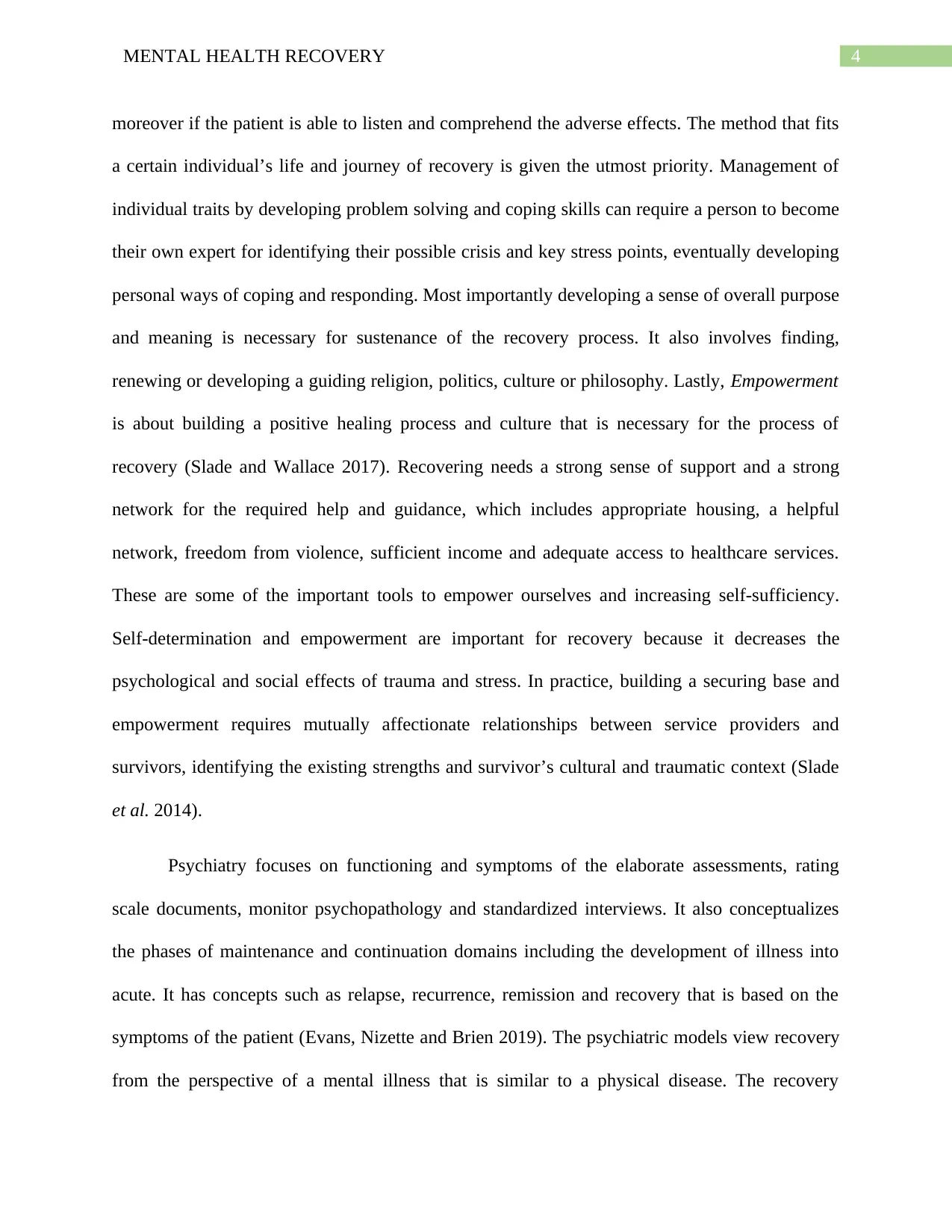
4MENTAL HEALTH RECOVERY
moreover if the patient is able to listen and comprehend the adverse effects. The method that fits
a certain individual’s life and journey of recovery is given the utmost priority. Management of
individual traits by developing problem solving and coping skills can require a person to become
their own expert for identifying their possible crisis and key stress points, eventually developing
personal ways of coping and responding. Most importantly developing a sense of overall purpose
and meaning is necessary for sustenance of the recovery process. It also involves finding,
renewing or developing a guiding religion, politics, culture or philosophy. Lastly, Empowerment
is about building a positive healing process and culture that is necessary for the process of
recovery (Slade and Wallace 2017). Recovering needs a strong sense of support and a strong
network for the required help and guidance, which includes appropriate housing, a helpful
network, freedom from violence, sufficient income and adequate access to healthcare services.
These are some of the important tools to empower ourselves and increasing self-sufficiency.
Self-determination and empowerment are important for recovery because it decreases the
psychological and social effects of trauma and stress. In practice, building a securing base and
empowerment requires mutually affectionate relationships between service providers and
survivors, identifying the existing strengths and survivor’s cultural and traumatic context (Slade
et al. 2014).
Psychiatry focuses on functioning and symptoms of the elaborate assessments, rating
scale documents, monitor psychopathology and standardized interviews. It also conceptualizes
the phases of maintenance and continuation domains including the development of illness into
acute. It has concepts such as relapse, recurrence, remission and recovery that is based on the
symptoms of the patient (Evans, Nizette and Brien 2019). The psychiatric models view recovery
from the perspective of a mental illness that is similar to a physical disease. The recovery
moreover if the patient is able to listen and comprehend the adverse effects. The method that fits
a certain individual’s life and journey of recovery is given the utmost priority. Management of
individual traits by developing problem solving and coping skills can require a person to become
their own expert for identifying their possible crisis and key stress points, eventually developing
personal ways of coping and responding. Most importantly developing a sense of overall purpose
and meaning is necessary for sustenance of the recovery process. It also involves finding,
renewing or developing a guiding religion, politics, culture or philosophy. Lastly, Empowerment
is about building a positive healing process and culture that is necessary for the process of
recovery (Slade and Wallace 2017). Recovering needs a strong sense of support and a strong
network for the required help and guidance, which includes appropriate housing, a helpful
network, freedom from violence, sufficient income and adequate access to healthcare services.
These are some of the important tools to empower ourselves and increasing self-sufficiency.
Self-determination and empowerment are important for recovery because it decreases the
psychological and social effects of trauma and stress. In practice, building a securing base and
empowerment requires mutually affectionate relationships between service providers and
survivors, identifying the existing strengths and survivor’s cultural and traumatic context (Slade
et al. 2014).
Psychiatry focuses on functioning and symptoms of the elaborate assessments, rating
scale documents, monitor psychopathology and standardized interviews. It also conceptualizes
the phases of maintenance and continuation domains including the development of illness into
acute. It has concepts such as relapse, recurrence, remission and recovery that is based on the
symptoms of the patient (Evans, Nizette and Brien 2019). The psychiatric models view recovery
from the perspective of a mental illness that is similar to a physical disease. The recovery
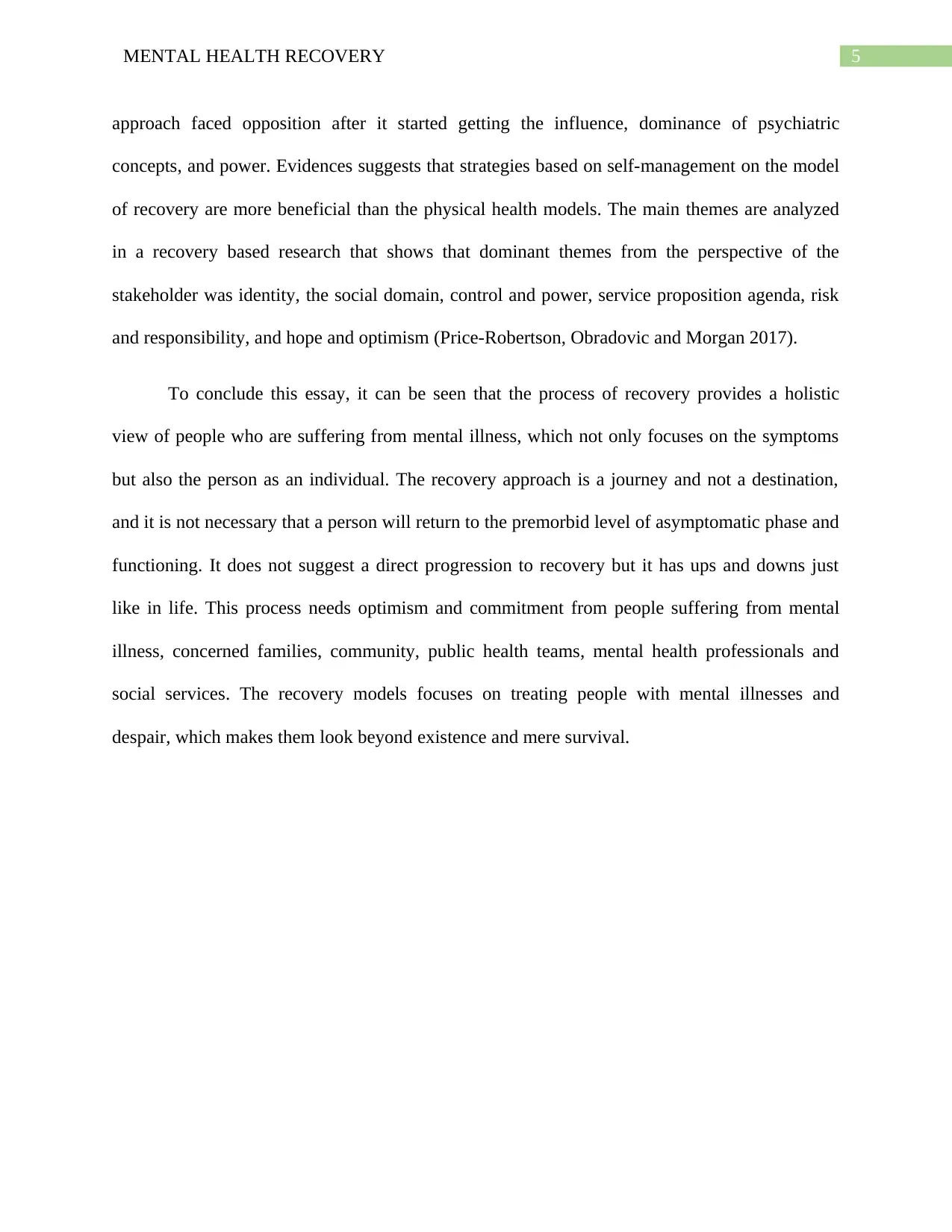
5MENTAL HEALTH RECOVERY
approach faced opposition after it started getting the influence, dominance of psychiatric
concepts, and power. Evidences suggests that strategies based on self-management on the model
of recovery are more beneficial than the physical health models. The main themes are analyzed
in a recovery based research that shows that dominant themes from the perspective of the
stakeholder was identity, the social domain, control and power, service proposition agenda, risk
and responsibility, and hope and optimism (Price-Robertson, Obradovic and Morgan 2017).
To conclude this essay, it can be seen that the process of recovery provides a holistic
view of people who are suffering from mental illness, which not only focuses on the symptoms
but also the person as an individual. The recovery approach is a journey and not a destination,
and it is not necessary that a person will return to the premorbid level of asymptomatic phase and
functioning. It does not suggest a direct progression to recovery but it has ups and downs just
like in life. This process needs optimism and commitment from people suffering from mental
illness, concerned families, community, public health teams, mental health professionals and
social services. The recovery models focuses on treating people with mental illnesses and
despair, which makes them look beyond existence and mere survival.
approach faced opposition after it started getting the influence, dominance of psychiatric
concepts, and power. Evidences suggests that strategies based on self-management on the model
of recovery are more beneficial than the physical health models. The main themes are analyzed
in a recovery based research that shows that dominant themes from the perspective of the
stakeholder was identity, the social domain, control and power, service proposition agenda, risk
and responsibility, and hope and optimism (Price-Robertson, Obradovic and Morgan 2017).
To conclude this essay, it can be seen that the process of recovery provides a holistic
view of people who are suffering from mental illness, which not only focuses on the symptoms
but also the person as an individual. The recovery approach is a journey and not a destination,
and it is not necessary that a person will return to the premorbid level of asymptomatic phase and
functioning. It does not suggest a direct progression to recovery but it has ups and downs just
like in life. This process needs optimism and commitment from people suffering from mental
illness, concerned families, community, public health teams, mental health professionals and
social services. The recovery models focuses on treating people with mental illnesses and
despair, which makes them look beyond existence and mere survival.
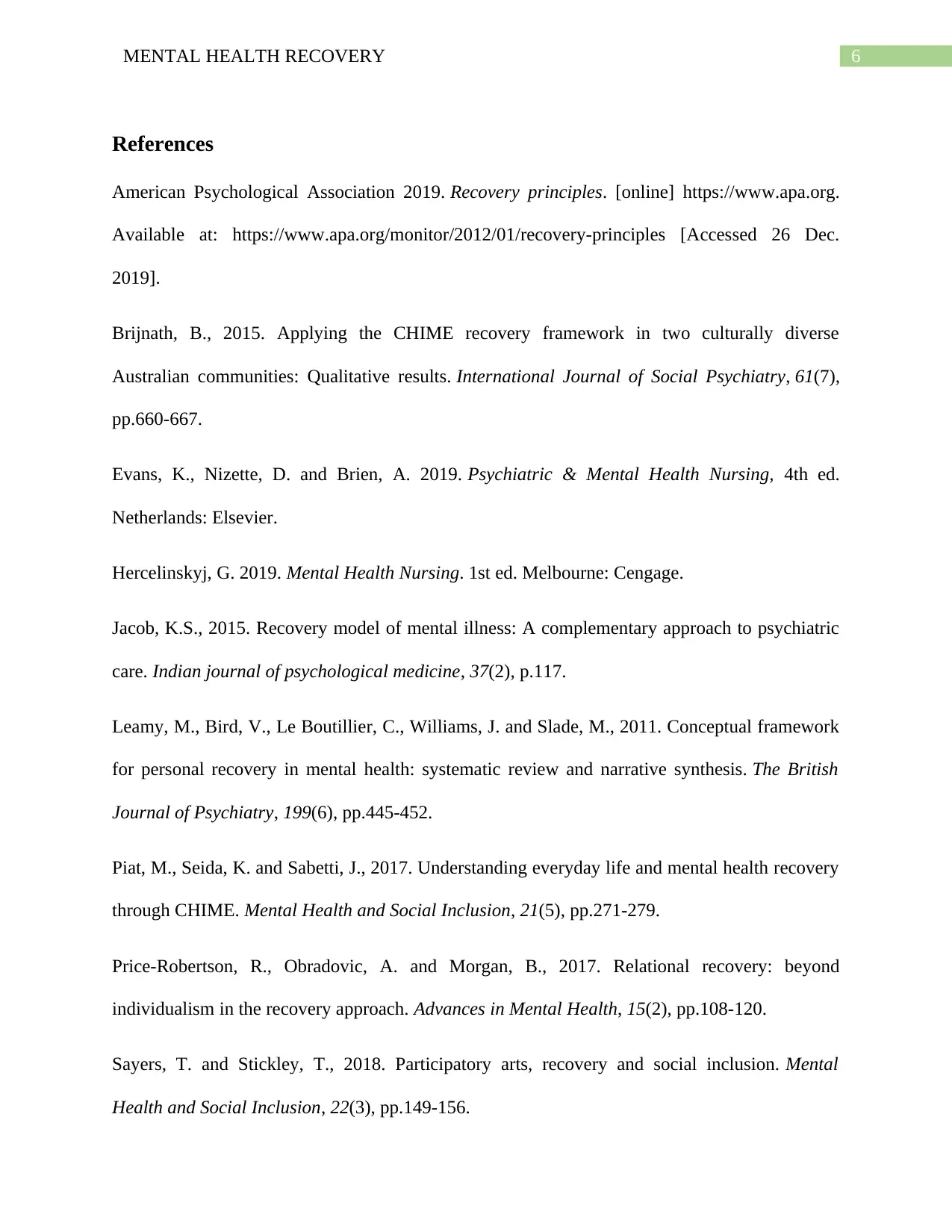
6MENTAL HEALTH RECOVERY
References
American Psychological Association 2019. Recovery principles. [online] https://www.apa.org.
Available at: https://www.apa.org/monitor/2012/01/recovery-principles [Accessed 26 Dec.
2019].
Brijnath, B., 2015. Applying the CHIME recovery framework in two culturally diverse
Australian communities: Qualitative results. International Journal of Social Psychiatry, 61(7),
pp.660-667.
Evans, K., Nizette, D. and Brien, A. 2019. Psychiatric & Mental Health Nursing, 4th ed.
Netherlands: Elsevier.
Hercelinskyj, G. 2019. Mental Health Nursing. 1st ed. Melbourne: Cengage.
Jacob, K.S., 2015. Recovery model of mental illness: A complementary approach to psychiatric
care. Indian journal of psychological medicine, 37(2), p.117.
Leamy, M., Bird, V., Le Boutillier, C., Williams, J. and Slade, M., 2011. Conceptual framework
for personal recovery in mental health: systematic review and narrative synthesis. The British
Journal of Psychiatry, 199(6), pp.445-452.
Piat, M., Seida, K. and Sabetti, J., 2017. Understanding everyday life and mental health recovery
through CHIME. Mental Health and Social Inclusion, 21(5), pp.271-279.
Price-Robertson, R., Obradovic, A. and Morgan, B., 2017. Relational recovery: beyond
individualism in the recovery approach. Advances in Mental Health, 15(2), pp.108-120.
Sayers, T. and Stickley, T., 2018. Participatory arts, recovery and social inclusion. Mental
Health and Social Inclusion, 22(3), pp.149-156.
References
American Psychological Association 2019. Recovery principles. [online] https://www.apa.org.
Available at: https://www.apa.org/monitor/2012/01/recovery-principles [Accessed 26 Dec.
2019].
Brijnath, B., 2015. Applying the CHIME recovery framework in two culturally diverse
Australian communities: Qualitative results. International Journal of Social Psychiatry, 61(7),
pp.660-667.
Evans, K., Nizette, D. and Brien, A. 2019. Psychiatric & Mental Health Nursing, 4th ed.
Netherlands: Elsevier.
Hercelinskyj, G. 2019. Mental Health Nursing. 1st ed. Melbourne: Cengage.
Jacob, K.S., 2015. Recovery model of mental illness: A complementary approach to psychiatric
care. Indian journal of psychological medicine, 37(2), p.117.
Leamy, M., Bird, V., Le Boutillier, C., Williams, J. and Slade, M., 2011. Conceptual framework
for personal recovery in mental health: systematic review and narrative synthesis. The British
Journal of Psychiatry, 199(6), pp.445-452.
Piat, M., Seida, K. and Sabetti, J., 2017. Understanding everyday life and mental health recovery
through CHIME. Mental Health and Social Inclusion, 21(5), pp.271-279.
Price-Robertson, R., Obradovic, A. and Morgan, B., 2017. Relational recovery: beyond
individualism in the recovery approach. Advances in Mental Health, 15(2), pp.108-120.
Sayers, T. and Stickley, T., 2018. Participatory arts, recovery and social inclusion. Mental
Health and Social Inclusion, 22(3), pp.149-156.
Paraphrase This Document
Need a fresh take? Get an instant paraphrase of this document with our AI Paraphraser
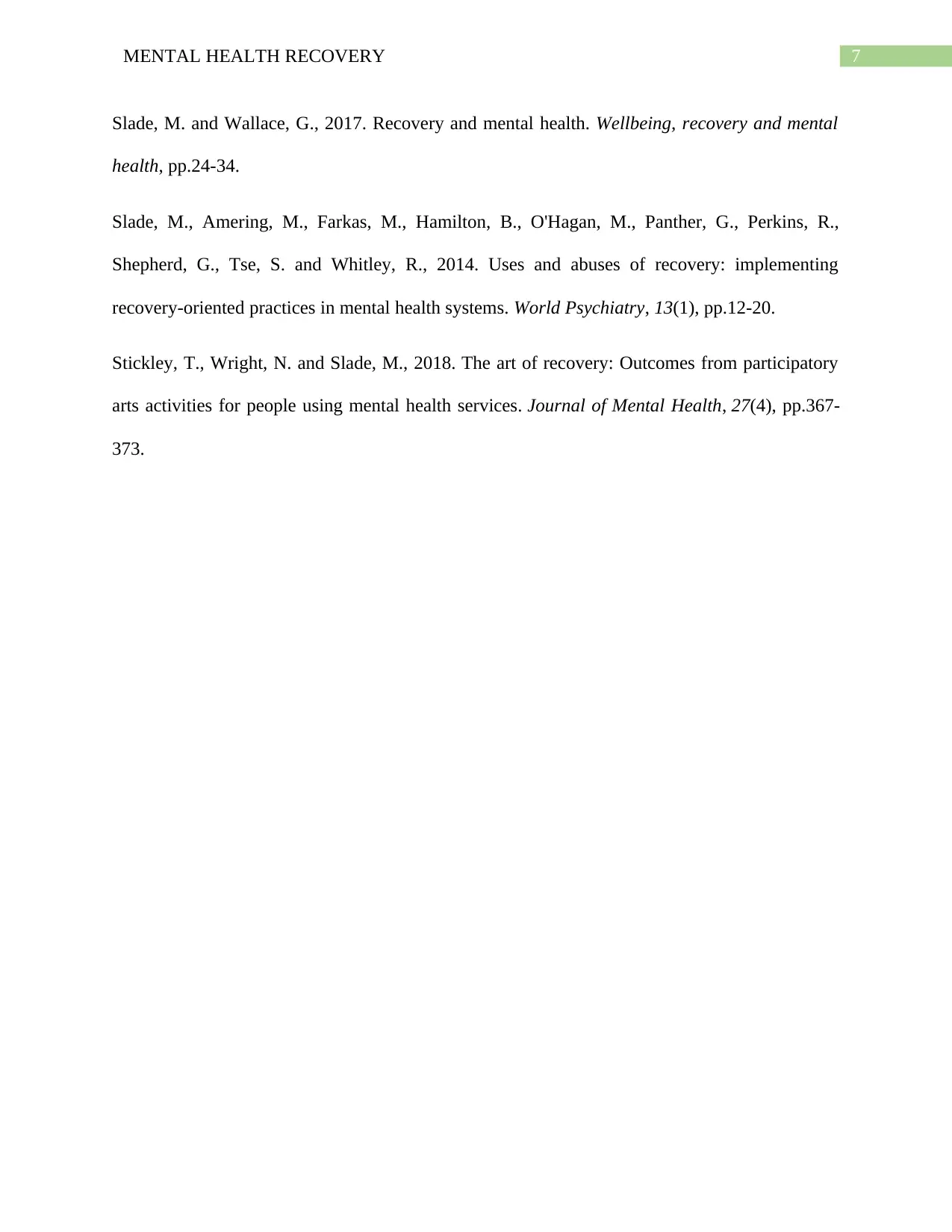
7MENTAL HEALTH RECOVERY
Slade, M. and Wallace, G., 2017. Recovery and mental health. Wellbeing, recovery and mental
health, pp.24-34.
Slade, M., Amering, M., Farkas, M., Hamilton, B., O'Hagan, M., Panther, G., Perkins, R.,
Shepherd, G., Tse, S. and Whitley, R., 2014. Uses and abuses of recovery: implementing
recovery‐oriented practices in mental health systems. World Psychiatry, 13(1), pp.12-20.
Stickley, T., Wright, N. and Slade, M., 2018. The art of recovery: Outcomes from participatory
arts activities for people using mental health services. Journal of Mental Health, 27(4), pp.367-
373.
Slade, M. and Wallace, G., 2017. Recovery and mental health. Wellbeing, recovery and mental
health, pp.24-34.
Slade, M., Amering, M., Farkas, M., Hamilton, B., O'Hagan, M., Panther, G., Perkins, R.,
Shepherd, G., Tse, S. and Whitley, R., 2014. Uses and abuses of recovery: implementing
recovery‐oriented practices in mental health systems. World Psychiatry, 13(1), pp.12-20.
Stickley, T., Wright, N. and Slade, M., 2018. The art of recovery: Outcomes from participatory
arts activities for people using mental health services. Journal of Mental Health, 27(4), pp.367-
373.
1 out of 8
Related Documents
Your All-in-One AI-Powered Toolkit for Academic Success.
+13062052269
info@desklib.com
Available 24*7 on WhatsApp / Email
![[object Object]](/_next/static/media/star-bottom.7253800d.svg)
Unlock your academic potential
© 2024 | Zucol Services PVT LTD | All rights reserved.





